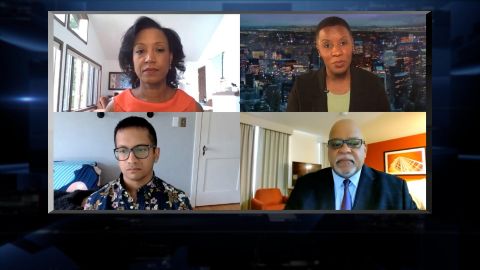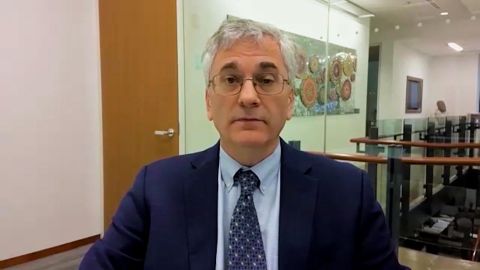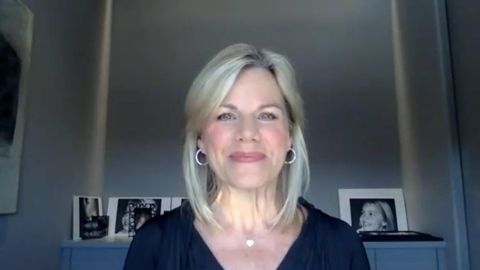Often, former criminal offenders wind up back behind bars, in part because they are not given proper resources.
Goldsmith has been working to change that with his organization called get out, stay out, a nonprofit that helps young men incarcerated on Rikers Island reenter society by providing them with employment opportunities, skills training.
He spent most of his career as a successful executive in because medics industry before committing to a career of service.
He wrote about this transition in his book titled from Madison Avenue to Rikers Island, in which he encourages others that it is never too late to take up a life of service.
Joining us now as part of our chasing the dream initiative is author and founder of getting out, staying out, Mark Goldsmith.
Thank you for joining us.
Mark: I would like to record exactly what you said.
Rafael: You will be able to watch that and have it yourself.
The book is fascinating.
For some context, let's start with the Madison Avenue part of your career.
Mark: I was in the cosmetics business for over 35 years.
I started with Cody, just bought by Pfizer.
Then I went to Revlon.
You remember the men's,?
Rafael: Green bottle?
Mark: Then I ran the Stan Laure nt -- yves saint laurent's fragrance business.
35 year career.
Rafael: The book talks about from Madison Avenue to Rikers Island.
Explain how and why you got to Rikers Island and the impact it had on you.
Mark: I can thank my wife, Dr. Arlene Goldsmith, PhD social worker, who founded an organization.
She suggested to me that I do something for the day.
I said, what is that?
She said you go into the New York City school system and talk to him people about their future.
I said that is great.
I asked for the toughest school in New York.
I said, do not send me to a fancy school like my kids went.
They did.
They sent me to Rikers Island.
I cannot believe it.
I walked into Rikers Island, was introduced to EGD program, run Gloria Ortiz.
She had started the Horizon Academy on Rikers Island.
There were 25 young men.
I said what will I talk to them about?
We talk sports a wild.
Then I asked what they wanted to do with the rest of their lives.
They did not have a clue.
I asked them, do any of you guys know how to sell?
In business, that is called being a sales man.
You get paid a commission and you do not go to jail for it.
They said, that is cool.
I think him who keeps the money?
They said this guy over here.
I said he can be the finance guy.
I said, who spreads the word where you get drugs?
That is the advertising guide.
What I basically did was place them all in the corporate environment and talk to them about what it might be like.
And we have never seen them listen to a weight two hours.
-- a white guy for two hours.
I got them to talk.
They were articulate, intelligent.
I had the best time and I went back to work.
Rafael: Fascinating conversation.
Were you able to get them to relate to skills that had to do with, unfortunately, their conduct and showed how those skills could work in the world world?
You got their attention.
How do you start officially this program?
Mark: The last thing I had an idea was that I would start the nonprofit.
We back and started to go once a week.
Turns out one of the guys gets out.
I said, what will you do now?
I set myself up at Starbucks, 39th and Madison.
As on this young man.
-- I saw this young man.
We started to talk about what he might like to do.
Then another guy got out.
For the most part, everybody was due Rikers Island and gets convicted goes up top, to an upstate prison.
When those guys would go up top, I ended up being there corresponded parent I wrote to them, kept them interested.
There is a young man up there I have known for 20 years.
We still talk.
That is what happened.
Then my wife said, why don't you start a nonprofit?
I opened it up.
I had to get in office.
I cannot get an office, because people do not want to rent to a guy who is having formerly incarcerated people in their building.
The answer to that is simple.
Storefront on 116th Street.
I started walking from virtually dry and found an office where they could walk in from the street, did not have to go through the lobby.
The program has since expanded into several offices in Harlem.
Jack: We have a lot I want to get in here.
Fascinating beginning to this.
Let's jump ahead.
What sort of services and skills training is the organization able to provide?
Mark: You mentioned it.
It is called the three e's -- education, employment, and emotional well-being.
My wife said only higher social workers with a Masters degree.
If they cannot deal with the emotions and thoughts of these young men, they will fail.
From day one, we only hired social workers with a Masters degree, who did a form of therapy and a psychiatrist consultant.
Getting back to employment and education, the department of education, because I had done such a good job on Rikers, agreed to have a new GD facility in my offices.
We have a GED facility where young men can get their GED and hopefully go to college on site, run by the New York City, it is called District 79, the alternative school district of New York City.
When it came to employment, I set up the job readiness curriculum.
It was two weeks of intensive looking into every aspect of employment, starting with the fact that if they came early, left leg, and stayed off their cell phones, they could probably get promoted.
Then I got involved with various corporations who were willing to hire these young men, but I think the fact that they could succeed in the corporate world just by working hard, and getting pension -- Jack: I was fascinated by your attention to detail, things such as look the person in the eye when you're talking with them and stay off of your cell phone.
You went through mock job interviews with them.
I want to ask one thing and then they will come back to building the program.
We tend to look at numbers, statistics as an indicator of success.
I found yours to be remarkable.
One says that less then 15% of the people who go through your program go back to jail.
That compares to something in the range of 65% of others who do not do that.
Were you surprised by that number?
Mark: Having ever experienced either one of them, -- I will tell you a quick story that I am from Johnstown, Pennsylvania originally.
Before that, I got out of the Navy, went home, had a party, had too much to drink, ended up hitting a cop car and ended up in jail.
My father had to be a me out.
I am a man of color in New York City.
-- if I had been a man of color in New York City, I would've ended up on Rikers Island.
Jack: The majority of people are there have not yet been convicted of crimes that are waiting on convictions.
One question is to illustrate again the breadth and success of this program.
We talked about the numbers, but tell us what is the difference in cost for a year of somebody on Rikers Island as opposed to what you do?
Mark: Hundreds of thousands of dollars to house one individual at Rikers Island.
I should add that we are now taking young women into the program.
We have gotten calls in East Harlem of young women who are there.
The idea is it is hundreds of thousands of dollars.
Our costs, $15,000 per guy, per year.
Jack: If you are you numbers person, all you do is look at those numbers to get a sense of how impactful this program is.
Last thing -- if somebody says would be worthwhile program, how can I support it?
What is the answer?
Mark: Contact us.
The website is gosonyc.org.
Gosonyc.org.
Volunteering, you can volunteer, be a coach.
The single most important thing about volunteering is you get more out of it than the people you are helping.
Jack: So many people would say that.
There are enough a lot of young people out there who are a great deal from you.
Mark: That is why I wrote the book.
So many people are retiring.
What are they going to do?
Jack: Mark, I have got to run but solving book, congratulations on the success and impact you are having on these young people's lives.
Good luck to you in the future.
Thank you for spending time with us.
Mark: Thank you for your time.
Appreciate it.



